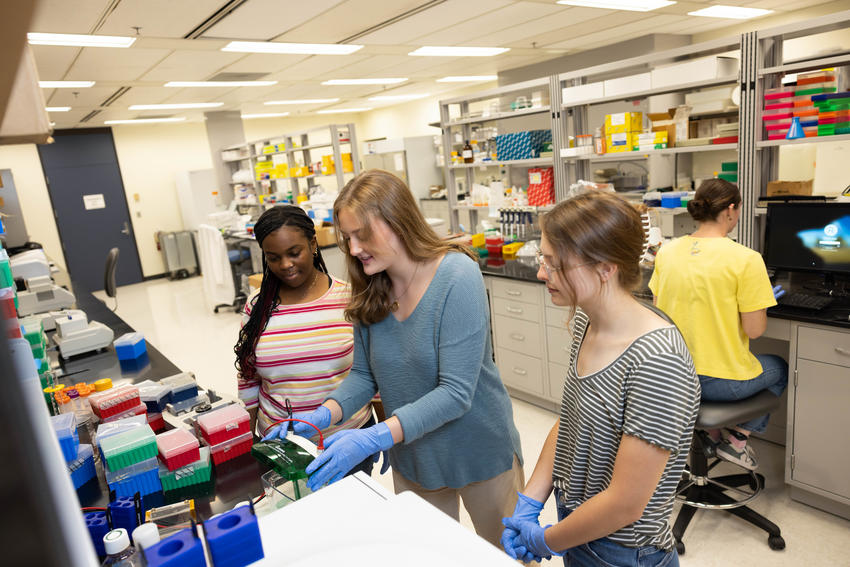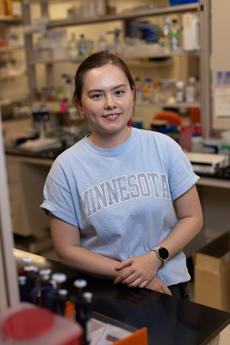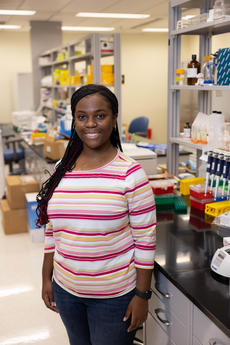MnCORE program provides inspiration, clarity to young researchers

The inaugural cohort of MnCORE learners are making an impact on research projects throughout Moos Tower.
The Minnesota Craniofacial and Oral Health Research Experience aims to introduce new generations of researchers to questions in craniofacial, oral health and dental research. The ten-week program invites undergraduate students to campus for a ten-week research project under the direction of a University of Minnesota faculty mentor, introducing the learners to oral biology, developing their professional skills and empowering them to complete a research project.
The first cohort includes eight undergraduate students, including four universities outside Minnesota, working on projects ranging from oral cancer to microbiology to cell biology. The majority of the learners are first-generation college students or Pell grant eligible—and for most of them, this summer has been their first organized research experience.
With this summer being the first time she has welcomed MnCORE students to campus, Kim Mansky, PhD, director of the program and professor of orthodontics, did not know what to expect. However, the learners have exceeded her expectations. “This group of students can make you laugh, but are also very curious and excited to learn more about oral biology and what a career in dentistry might look like for them,” she said. “These learners have set the bar high for the groups who will come after them.”
Clara Stein, a rising senior studying neuroscience at the University of Minnesota, applied to MnCORE after deciding to pursue dentistry. “It offered both the opportunity to continue refining my research skills and participate in career development events that would prepare me for dental school and my eventual career,” she said.
Stein works on a project started by Kristina Astleford-Hopper, DDS/PhD ’26, under Kim Mansky, PhD, professor of orthodontics and director of the program, investigating the epigenetic regulation of osteoclast differentiation. “Specifically, I’m looking at the correlation between changes in gene expression in the LSD1 pathway and the extent of osteoclast differentiation in the femur and the mandible,” she explained. “Although I am doing basic science research, my project has interesting future clinical implications for inflammation-related diseases such as gingivitis and rheumatoid arthritis.”
Morgan Pride, a second year biology student at North Carolina Agricultural and Technical State University, has long held an interest in dentistry, but was surprised to learn that research opportunities abound. “When I discovered this program, I knew I needed to apply,” she said. “I love to learn, especially when it’s an area I’m passionate about.”
Pride is working in the lab of Robert Jones, DDS, PhD, associate professor of pediatric
dentistry, under the guidance of Dhiraj Kumar, PhD, research assistant professor of pediatric
dentistry. “My project is to evaluate the antimicrobial activity and cleansing efficiency of a
commercial nasal solution containing oxymetazoline against Streptococcus mutans and Rothia
dentocariosa for pulpal management,” she explained.
Both learners have a passion for research and a commitment to producing excellent work.
“Research allows me to dive deeper into the complex pathways and relationships that govern how we function,” said Stein. “It brings me beyond the scope of the topics I learn in class, toward the broader context of human health. As I work alongside mentors, lab members and collaborators, I’m developing strong critical thinking and problem-solving skills that will help me provide better care for my future patients.”
“Research is the bridge between the present and the future,” said Pride. “It is exciting to be part of an experience that can potentially change the future. The thought of being able to improve current procedures or develop new treatments that can advance disease detection and management is fascinating to me.”
So far, Stein and Pride and their fellow learners have gained great insight into the field of dentistry and what it means to be a clinician, a scientist and researcher.
“It is exciting to be in a space where I get to learn and practice research skills and critical thinking while working alongside others at varied stages in their careers,” Stein reflected. “It has also been very eye opening to see the breadth of oral biology and the dental field. I am excited to translate the skills and knowledge I have gained here to clinical care, where I can directly impact my patients’ health and wellbeing.”
“This experience has been very validating regarding what I want to do in the future,” said Pride. “The career development sessions have opened my eyes to the possibilities of pursuing a PhD in oral biology, in addition to a DDS or DMD. I have fallen even more in love with the research process, and the realization that I can successfully pursue both the art of healing and the joy of discovery.”

